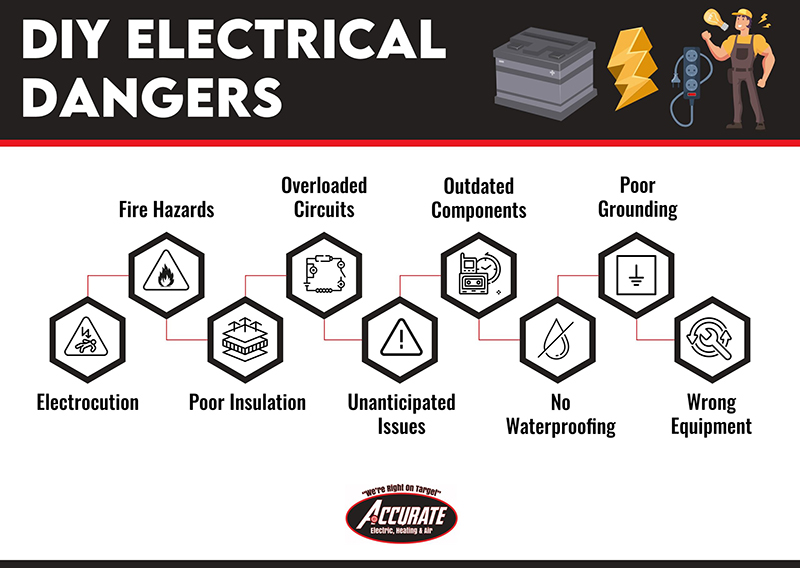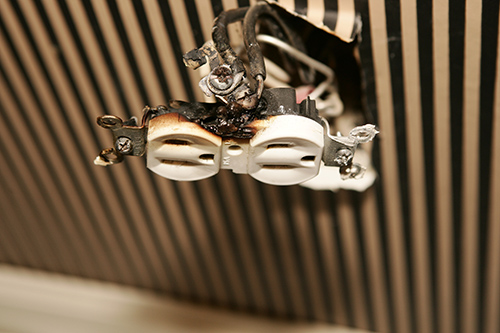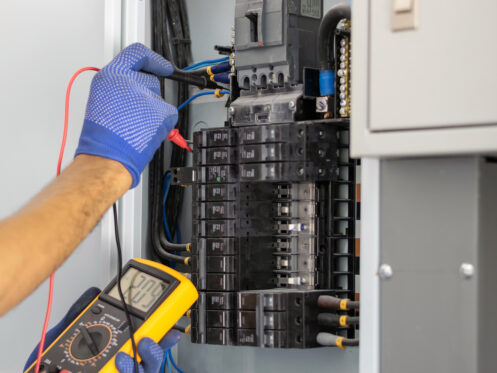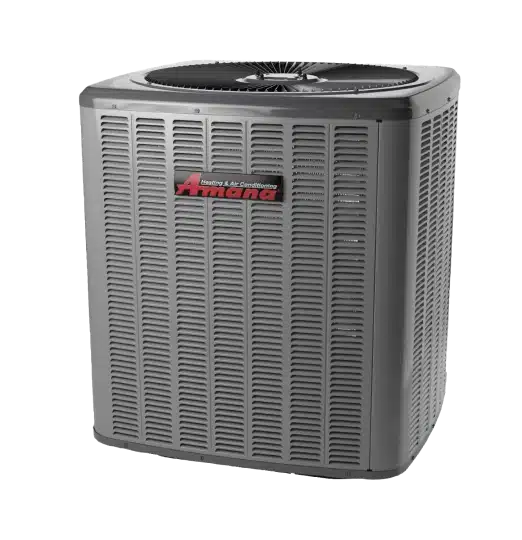It may seem like a cost-effective and empowering choice to handle electrical rewiring issues on your own. However, it’s crucial to understand the gravity of the risks involved. From the potential for electrocution to the threat of fires, the dangers of DIY electrical work are not to be taken lightly. At Accurate Home Services, we’re here to provide the professional help Crandall residents need for their electrical work. Read on to gain a more in-depth understanding of these hazards.
1. Electrocution Risks
Electrocution is a fatal outcome that occurs when a person comes into contact with an electric current. It is possibly the No. 1 most dangerous outcome for both DIY electrical work and professional work. The difference is that DIY electrical work is often performed in an unskilled and untrained manner that leaves people — you — open to electrocution. Even low-voltage shocks can disrupt the heart’s rhythm and lead to cardiac arrest or severe burns. Factors such as moisture, faulty wiring, and inadequate insulation heighten the risk of electric shock.
In DIY scenarios, amateur electricians and homeowners may expose themselves to live wires, mishandling electric tools, and neglecting safety precautions without realizing it. Prevention is paramount. Anyone performing electrical work must always make sure that they switch off power sources before starting work, employ appropriate proactive gear, and use insulated tools. It’s also important to understand basic electrical principles to minimize risk. For most homeowners, DIY electrical work carries too high of a risk. Electrocution is often fatal or creates a debilitating life-changing injury. Hiring professional electricians makes it possible to avoid this preventable danger.
2. Fire Hazards

3. Poor Insulation
Poor insulation in DIY electrical work can create serious risks, including electric shocks and fires. Poor insulation increases the risk of danger because it increases the risk of wires coming into contact with conductive materials or surfaces, which can lead to deadly outcomes. Moreover, it increases the chances of overheating, which can ruin the wiring system and cause significant safety hazards. Good insulation will help lessen these risks, but you’d need to understand how to properly install insulation.
4. Overloaded Circuits
Overloaded circuits are another common hazard in DIY electrical work. When too many appliances or home devices draw power from a single circuit at the same time, there is an excess demand that leads to overheating. Overheating leads to overloaded circuits, and the risk of electric shocks increases, as does equipment damage. DIY homeowners often underestimate the capacity of circuits and place too much strain on the electrical system.
On a budget? Apply for financing online or call 972-366-0557 today to learn more.
5. DIY Mistakes That Can End in Catastrophe
DIY electrical work can lead to catastrophic consequences of improper wiring connections, incorrect circuit installations, incorrect insulation installation, poor grounding, and more. These errors are bound to lead to severe damage, both to family members living in the home and to the home itself. Too many DIY homeowners attempt to cut corners on safety protocols or neglect to follow building codes because they are not familiar with the codes.
This creates an additional risk and puts everybody in the home at risk of electric shock. If your home needs electrical work, it’s always better to consult a professional electrician who can perform the work safely and protect you and your loved ones as well as your home.
6. Unanticipated Electrical Issues

7. Outdated Components
Outdated electrical components, including shocks, fires, and equipment failure, pose significant risks. Over time, your switches, outlets, wiring, and other electrical parts will break down due to wear, tear, and aging. This deterioration destroys the electrical components’ ability to conduct electricity, which leads to potential safety hazards. Outdated wiring also may not have the updated safety features that modern wiring has, such as grounding or arc fault circuit interrupters.
8. Water and Electricity: Deadly Combination
Water and electricity are deadly and can create significant risks for homeowners. When water comes into contact with an electric outlet, wire, or appliance, it can create a pathway for electricity to flow and lead to accidents. Unfortunately, most accidents involving water and electricity are fatal. All electrical appliances and outlets must be moved far away from water sources. Proper insulation and waterproofing are necessary for areas such as the kitchen, the bathroom, and outdoor spaces where water may be.
9. Poor Grounding
Poor grounding in electrical systems can lead to electric shock and fire risks. Grounding is necessary to provide a safe pathway for excess electrical energy to move into the ground and prevent an electrical overload. It also works to keep electrical circuits stable. Without proper grounding, homes can have stray currents, voltage fluctuations, and electrical surges that can lead to electric shock incidents.
10. Missing Professional Tools and Equipment
Undertaking DIY electrical work without professional-grade tools and equipment is dangerous. Safety is severely compromised when improper tools are used. Poor insulation and installation, loose connections, and defective repairs can all lead to fires, equipment failure, and electric shock. Homeowners often do not have access to professional electrician equipment such as voltage testers, conduit benders, and wire strippers.
Contact Us in Crandall Today
Navigating the electrical DIY world is dangerous and could cost you far more than you would ever save. From the dangers of electrocution and fire hazards to the risks created by poor insulation and overloaded circuits, every DIY electrical step must be carefully taken.
At Accurate Home Services, your safety is our top priority. Don’t take chances with your well-being or your home’s structural integrity. Trust our team of experienced professionals to handle all of your electrical needs with expertise and precision.
Additionally, we offer more than electrical repair: air conditioning, heating, indoor air quality, and full comprehensive whole-home maintenance plans are all available. Contact us in Crandall and the surrounding area today to schedule a consultation for your home needs.




